Warren Spector of Ion Storm (Part Two)
Deus Ex designer interviewed
Last week we talked to Warren Spector about his long career in the gaming industry, taking in RPG companies Steve Jackson Games and TSR, and computer game developers Origin and Looking Glass.
This week we find out what he's been up to for the last couple of years, as we talk to him about his latest game, Deus Ex...
Ion Storm
Warren had persuaded Boston-based developer Looking Glass to set up an Austin studio, but things had soon gone badly wrong as the company found itself over-stretched...
"I was working with Looking Glass when it became apparent that the company didn't really have the resources to maintain two offices separated by a couple of thousand miles. So we agreed that the best thing for everyone would be if we just shut the Austin office down."
It might have been the end for Looking Glass Austin, but most of the team stuck together as Warren looked for a new home for them...
"I knew I could find another deal somewhere", Warren explained. "The core of my Looking Glass Austin team stuck around, and we put together a couple of pretty cool proposals which got us to the point where we had a contract in hand and another on the way. I was THIS close to doing a start-up."
"That was when John Romero and Mike Wilson called and gave the ION Storm pitch. I thought it was too late, but they were persistent and persuasive AND they agreed to leave me alone to do my thing in Austin. I put aside plans to start my own development house and signed on with them."
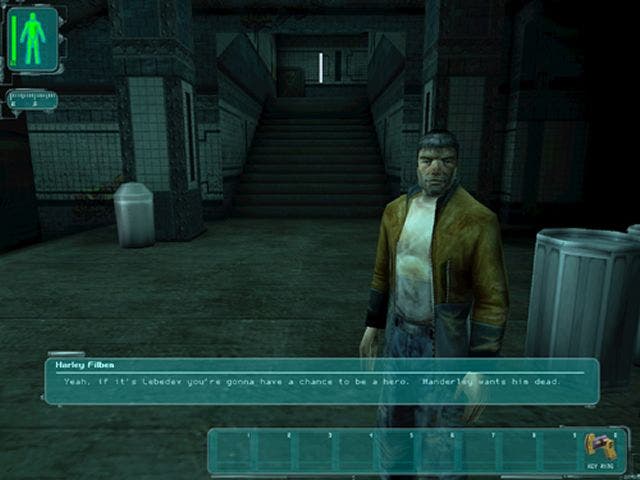
Deus Ex
Warren's first game for Ion Storm is Deus Ex. We asked him to describe the game for any of you who have been living under a rock for the past year and haven't heard of it before...
"I guess I'd describe it as the finest entertainment experience ever conceived by the mind of man - the most remarkable achievement since the Creation", Warren joked. "Okay, maybe not."
"Seriously, I guess I'd say Deus Ex is a game that combines the best elements of a variety of genres, and gives players the power to solve problems the way they want rather than the way the design team intended. And all of that is wrapped up in an accessible, easy to understand package with a believable, near future, real world setting."
"That just scratches the surface of the game but it's a start. Wait, let me try again - how about it's a game where you get to create a unique alter ego, a game about character differences where those differences are expressible minute to minute in gameplay."
"Nah, that's no good - accurate, but not pithy enough. The marketing guys hate me - I'm no good at the high concept stuff, and I guess the game reflects that! I'm just gonna give up.... ;)"
Um .. thanks. Anyway, moving swiftly on...
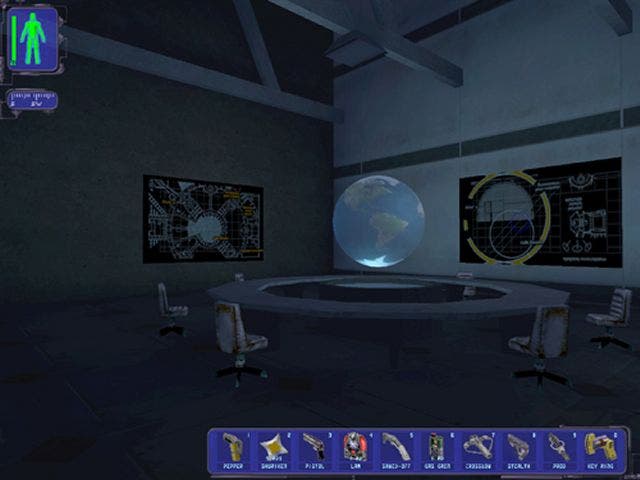
Freedom
Giving players the freedom to play the game the way they want to is one of Warren's favourite parts of Deus Ex...
"Computer gaming is supposedly all about interactivity, but typically we put players on rails and say, 'Okay, wiseguy, figure out what I want you to do here!' That hardly strikes me as particularly interactive, so in Deus Ex we're trying to set it up so you never have to play Guess What The Designer Had In Mind."
"I know we're on the right track when I hear the QA guys talking, and one says something like, 'It was cool when I snuck up on the guard and knocked him out, then hacked the security panel to shut down the turret and walked right up and lockpicked the door', while another guy says, 'You did what? I just blew the guard away with my sniper rifle, used a grenade to take out the turret and unlocked the door with the key I got from the bum on the back dock', while another says 'Heck, I just went around the back, climbed up to the second floor, came in through a window, and never even saw any of the stuff you guys are talking about!'"
"It's just little stuff, in a way, but I hope enough little stuff adds up to something really big."
All this little stuff has certainly added up to something big when it comes to balancing and play testing though...
"Oh, my, yes. Balancing this game has been an insane amount of work. We have guys reporting bugs about how they ran out of a particular resource - lockpicks, for instance. And we have to remind them that running out of lockpicks just means they can't pick locks. It doesn't mean they can't get through locked doors. You can always go find the keycodes for the keypad locks or go talk to the person who can tell you the code (in exchange for money or services, perhaps) or you can, in many cases, blow the door off its hinges."
"It's weird, people aren't used to games that offer choices. Frankly, we're not used to MAKING games like that, so tweaking and tuning has been, shall we say, an interesting and lengthy process!"
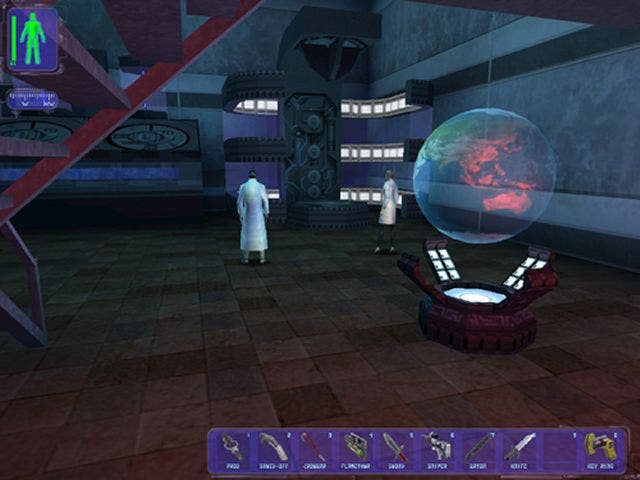
Augment
Part of that freedom is provided by the augmentations system, which we got Warren to explain for us...
"You play a character who has these nanotechnological augmentations that give him abilities normal people don't have. These submicroscopic nanobots swim around in the blood and muscles and make them twitch faster or generate electrical fields or send images to the brain and so on. So you can see in the dark or zoom in on distant objects. Or you can run really fast and jump really far. Or you can basically breath underwater. That kind of thing."
"The tricky bit is that you can't do everything. Each time you acquire an augmentation canister - a device that contains the ROM-encoding to give your nanites specific abilities - you have to make a choice about what ability you want to have. And once you make the choice, that's it. You're 'stuck' with it for the rest of the game."
"So, for example, you have to decide if you want to be the guy who moves silently at any speed OR the guy who runs really fast and jumps really far. You can't be both. And the choice implies a particular gameplay style."
"That's the secret of Deus Ex. All of the game systems are designed to work together to drive character differences. And those character differences have real significance in the way you navigate through the obstacle course the designers have created for you."
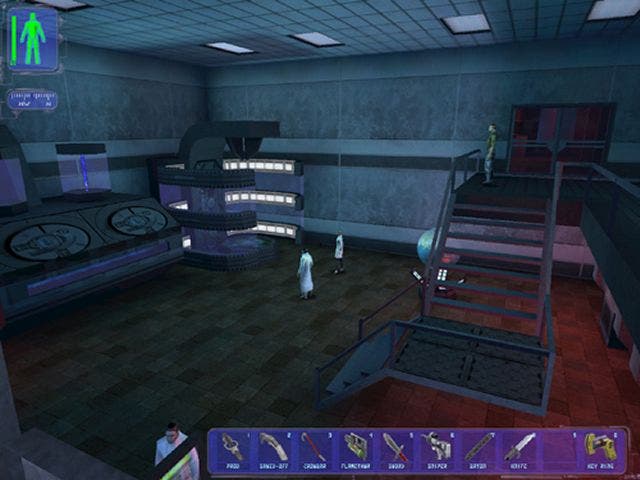
Inspired
One of the many things that makes Deus Ex stand out from the crowd is the real world near-future setting. Given that Warren was best known for his work on fantasy and sci-fi titles in the past, where did the idea for Deus Ex come from?
"Deus Ex was inspired by all sorts of stuff, as are most games", he explained. "You just kind of soak up influences from all around and mix 'em together until something cool and original (you hope!) comes out."
"Deus Ex started out as kind of a first-person action/roleplaying homage to films like Die Hard and Passenger 57 and Rambo and every James Bond film since the dawn of man. It seemed so weird to me that action films set in the real world were so popular, but games seemed to be stuck in a fantasy/SF rut. I figured we could break out of that and do something a little more believable."
"From there, it was a question of refining gameplay and setting. Gameplay was relatively simple. I wanted to build on the foundation laid by the Looking Glass guys in games like Underworld and System Shock (and later Half-Life, from Valve). But I also wanted to borrow some elements from other types of games - most notably, the strong story elements and the cool but straightforward character interaction of adventure games and console RPGs."
The final piece slotted into place while Warren was sat in front of the television one evening with his wife... "I looked about a foot to my left on the couch one Sunday night and realized my wife hadn't said a word to me in an hour because she was so wrapped up in the X-Files. I was already obsessing about the wacky, millenial conspiracy stuff on the net, so it all came together pretty naturally."
"The details of the story were another story entirely - that evolved over quite a long period of time and involved just about every member of the DX team."
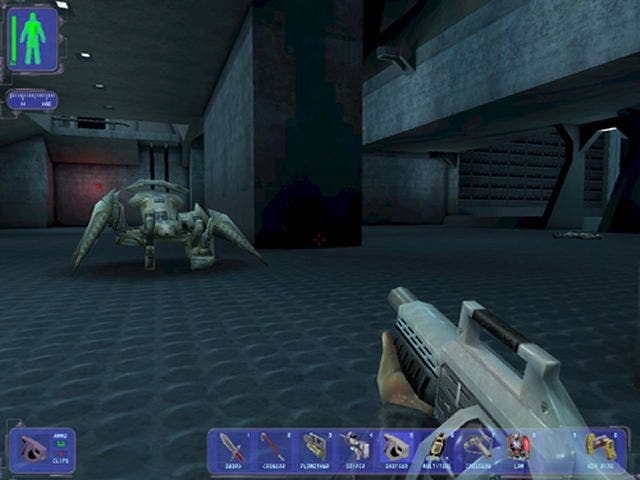
Under The Bonnet
With the basic design and setting locked down, all that was left was to select an engine to power the game.
Whereas Ion Storm's other projects, Anachronox and Daikatana, were already running on heavily modified versions of id Software's Quake and Quake 2 engines, the Unreal engine was selected for Deus Ex. As Warren explained to us, "Unreal was easily the best combination of performance and price available when we were in pre-production".
"It boasted a terrific toolset for designers to work with and seemed like it'd be easily extensible. We knew we'd be adding a lot of stuff to whatever engine we licensed (and we knew we didn't want to build something from scratch) so it had to be easily modified."
So what kind of new features have the Deus Ex team added to the already impressive Unreal engine?
"We added a conversation system, a bunch of 2D interface screens, new ways of dealing with weapons and objects, radically expanded AI capabilities, a realtime lip-syncing system that rocks hard. Just a bunch of stuff. Unreal provided a solid base from which to start."

Tweaked
Partly thanks to the "solid base" provided by the Unreal engine, development has been fairly rapid for such an ambitious game, and Deus Ex is now in final testing and tweaking...
"The game's coming along great", according to Warren. "We're still working on audio pretty heavily. There's a LOT of speech in the game, since character interaction is a huge part of what goes on."
"The AI will be a work in progress until the day we ship - there's SO much we want to do in that area... And we're still trying to balance combat and make sure there are always alternate paths around problems, and that players who select different combinations of skills and augmentations all have fun and... Did I mention that tweaking and tuning has been an interesting process?"
Unfortunately this has led to one high profile casualty - multiplayer support. In an interview back in 1998, Warren said that "It'd be nuts to release a game of most any kind in 1999 without multiplayer capability"... So what changed?
"Hey, no fair throwing my own words back at me! Yeah, it would have been nuts to ship a non-multiplayer game in 1999. But it's 2000 now, so we're off the hook!"
"What's that? You're not buying that? Damn. Okay, the bottom line is that Deus Ex was always conceived as a single-player, story-based game of character development. That hasn't changed. Balancing this thing has been more time-consuming than making the game in the first place. We've basically been playable since last October and we're STILL working on balancing!"
Because of this the team hasn't been able to "spend enough time on multiplayer to make it work the way it needs to", and so rather than just including a rushed deathmatch mode, the multiplayer component of the game has been stripped out entirely. But can we expect a "point release" or mission pack to add multiplayer later in the year?
"I'm not a fan of introducing new features in patches", Warren told us. "IF we do a multiplayer thing for Deus Ex it'll be in a mission pack or, dare I say it, in a sequel."
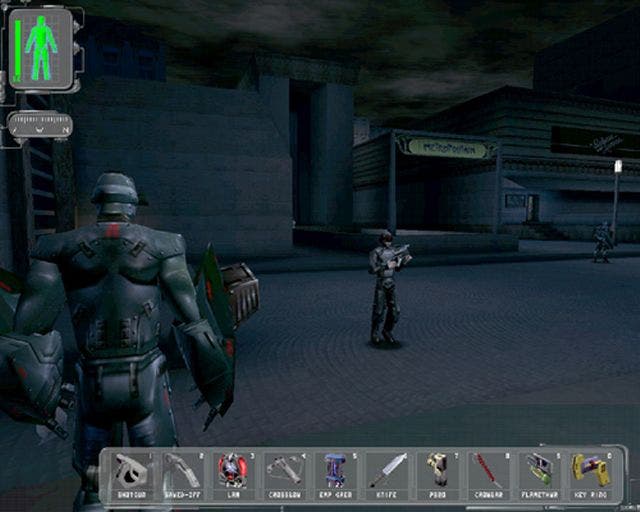
The Future
So with Deus Ex almost complete and all this talk of sequels, we asked Warren what he had planned for the future.
"Obviously, I hope Deus Ex is successful enough to warrant an add-in or mission pack", he told us. "And as much as I dislike the way this business depends on sequels, I really do think we're creating a world and a set of characters interesting enough that it'd be cool to set more stories in the Deus Ex universe."
"But I'm also itching to try some console stuff, and I'm about ready to try a fantasy roleplaying game again. It's been a while. Maybe someone will be foolish enough to give me and the team a bunch of money to see if we can make a console RPG."
"I've had this cool fantasy world percolating away in the back of my mind for about a decade. It may just be time to set a game there. Anyone at Eidos or ION listening?" Thanks to Eva Whitlow @ Eidos UK and Chad Barron @ Ion Storm for their help in arranging this interview, and of course to Warren Spector himself for taking part in it.
-
Warren Spector interview (Part One)

